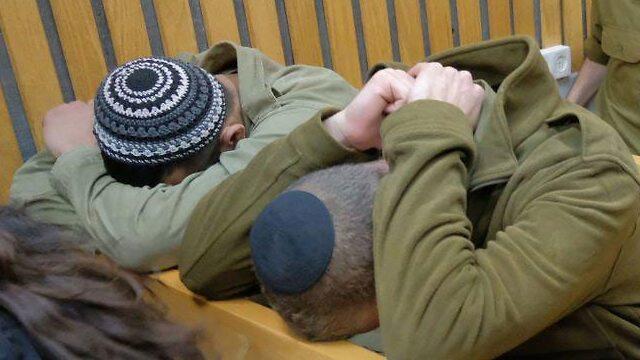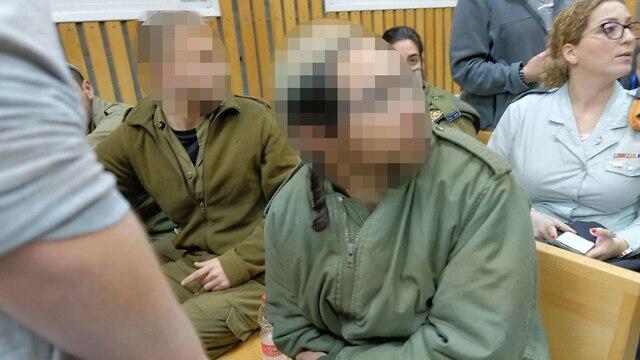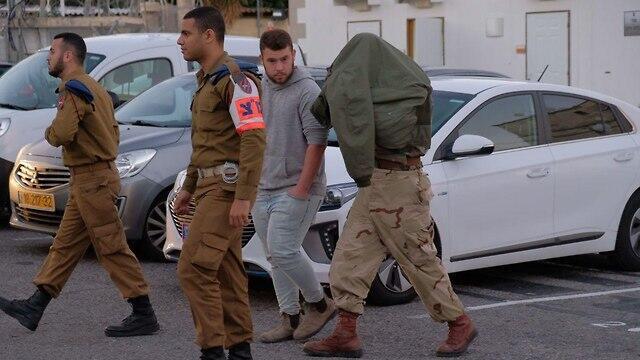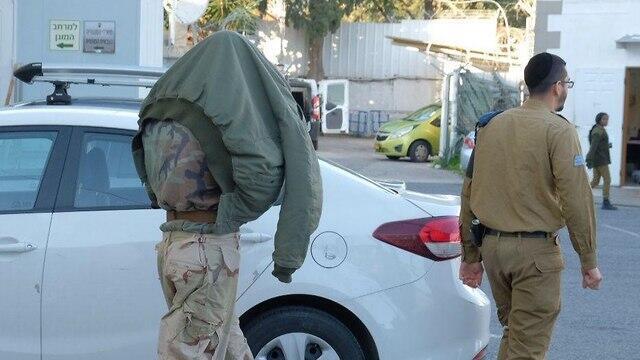Getting your Trinity Audio player ready...
The shocking testimonies of a Palestinian father and son, beaten by five Israeli soldiers from the IDF's religious battalion Netzah Yehuda—while their commanders passively watched—reveal the extent of the violence used against them, which included the troops stepping on the detainees’ faces as well as breaking their noses and ribs, all whilst filming the unsettling ordeal.
and Twitter
The incident took place earlier this month during a manhunt for As'am Barghouti ,who shot dead two soldiers from the Netzah Yehuda Battalion at the Giv'at Asaf outpost in the West Bank in December. The two Palestinians were arrested on suspicion of helping Barghouti and his brother—who were also involved in a terror attack near the settlement of Ofra that left seven people wounded—evade capture. Five combat soldiers from the battalion were indicted last month with aggravated abuse and aggravated battery. The commander of the platoon was indicted on Monday for failing to prevent the actions of his subordinates.
The testimonies of the two Palestinians—a 50-year-old man and his 15-year-old son—are part of some 300 pages that provide a detailed, overall account of the incident, in which the two detainees were violently abused during a short car ride from their home to a Shin Bet base for questioning.
So far, only the accounts of the defendants have been made public. The five soldiers and their peers claimed to have been emotionally scarred by the murder of two comrades-in-arms—Sergeant Yosef Cohen and Staff Sergeant Yovel Mor Yosef—when they joined a large Israeli special overnight mission on January 7, 2019 to apprehend Barghouti's alleged accomplices.
The abuse endured by the two Palestininas was discovered only when a different IDF unit took custody of the detainees in order to escort them to the Shin Bet interrogation facility, and noticed the two detainees had been severely beaten. The father and son were then hospitalized at Shaare Zedek Medical Center in Jerusalem with broken ribs and crushed noses.
"I was lying on my back, with hands cuffed behind my back and a blindfold over my eyes,” says the 15-year-old suspect. “I was kicked by four soldiers—who used their hands, feet and the barrels of their M16 rifles—in the face, chest, abdomen, legs, and testicles … I couldn't open my left eye and my mouth was filled with blood. My shirt was also covered in blood because I was bleeding from my nose … One of the soldiers stepped on my leg.”
The teenager said that he and his father also endured verbal abuse from the soldiers. "One of the soldiers asked me to say 'In spirit and in blood we will redeem you, Palestine.' They cursed me in Arabic and in Hebrew and forced me to look at my father being beaten,” said the son. “Everytime they would take off my blindfold, they would say: ‘Look at your father, he deserves to be beaten.’”
"I saw them breaking my father’s ribs by beating him in the chest with gun barrels. My hands were tied behind my back, I could not do anything, I did not say anything. I could not resist and no one in the vehicle tried to prevent the violence,” the teenager said.
The teen's 50-year-old father says he was beaten so badly that at a certain point he lost consciousness. “One of the soldiers stepped on my face and broke my nose. I was bleeding profusely throughout the entire car ride but the soldiers didn’t give me any help.” he said. "When they initially came to arrest me, they released dogs into the house, interrogated me for half an hour at a neighbors' home, and then they took me to the car," the father added.
"In the hospital I had an operation, and three of my ribs were broken. I had been stepped on by the soldiers at least five times … I screamed at them at the top of my lungs, asking them why they were beating me, but one of them just told me to shut up. I also heard my son screaming and crying as he was being beaten," the father said.
One of the critical pieces of evidence in the case is a 30-second video recorded by the soldiers during the incident, which the Jaffa Military Court banned from being released at the request of the Military Prosecution and the accused troops themselves.
The video appears to show one of the soldiers calling the name of another fighter, who is not in the vehicle. The soldier calling out is apparently the one who recorded the video, which he claims was to expose the shocking attack.
"I addressed someone who was the battalion commander at our brigade’s training base. He was the commander of the soldiers, he raised them," the soldier told his interrogators. "I filmed it for him, so he would see what kind of shit soldiers he had brought up. I then sent him the video."
The soldier initially denied he had filmed the video and only admitted to the deed once the investigators presented him with evidence. "This is an unpleasant situation, even shameful … I was filming it in order to stop what was happening,” he later told the investigators.
According to the transcript of the investigation conducted by the Military Police Criminal Investigation Division, the front seat of the military vehicle in which the attack took place was occupied by a driver, a platoon commander and another soldier. The three claim that they had not noticed the violence taking place in the back seat due to the partition separating the front and the back seats.
"I wasn’t aware of what was happening behind me," the soldier told the interrogators. “I would turn around once in a while, but for only two or three seconds. I heard two or three slaps as well as one of the detainees saying ‘ouch.’ I also heard the platoon commander telling the soldiers to stop. When I got out of the car, I saw toilet paper covered in blood.”
One of the indicted troops, a sergeant who was traveling in the back of the car, initially attempted to claim that the two Palestinians had been beaten prior to being handed over to the Netzah Yehuda troops and tried to play down his part in the incident.
"When I saw one of the detainees remove his blindfold, I hit him in the face a couple of times … I assumed that they were beaten during the arrest by a SWAT force or a battalion commander,” he said.
"I don’t usually behave like this, I had to stop myself because this kind of behavior doesn’t become me. I lost myself, but as far as I am concerned, the violence wasn’t an act of revenge. I just lost it in that moment because I was emotional and overstepped my authority,” he added.
The sergeant also attempted to minimize the soldiers' culpability for the incident by suggesting that the violence only broke out after the car passed the spot where their two comrades-in-arms had been shot by the terrorist whom their two charges had allegedly hidden in their home. "Things started to unravel because I was in a state of emotional turmoil, to pass the place where they were murdered … It brought up all the feelings I’ve been dealing with for over a month,” he said.
5 View gallery
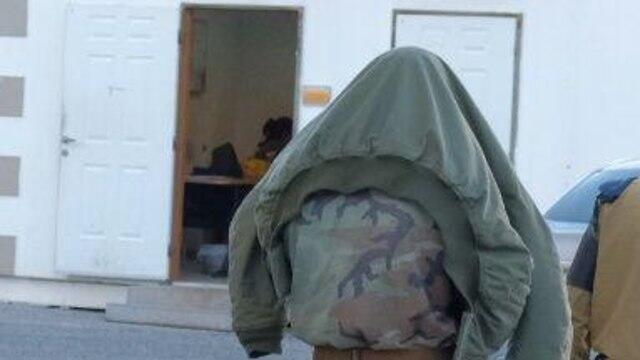

One of the indicted Netzah Yehuda soldiers is covering his face as he is brought into court
(צילום: שאול גולן)
There were also discrepancies in the testimonies of the platoon commander and the soldiers who were sitting on the back seat. While the commander claimed he had not detected any unusual activity in the back of the vehicle—and only heard the troops celebrating the capture of the terrorist's accomplices—some of the troops tell a different story.
"Two of the commanders asked us to stop. The emotions were running high and in my opinion they should not have put the detainees in the car with us to begin with … the detainees helped the terrorist who killed our friends,” said one of the soldiers. “After the first couple of punches, I did not say too much … I didn’t have the courage to tell them to stop, but afterwards I raised my voice. The beating went on non-stop for some 10-15 minutes until the two detainees stopped screaming. The father shouted at us, but did not try to resist. "
A squad commander, who was supposed to at the very least restrain his soldiers in the tense situation, also participated in the violence. “I hit the detainees out of pain, not because I was looking to lash out. When I saw the bullet-ridden bus stop where our friends were killed, I lost myself for a few moments, but it doesn’t mean that I have lost my humanity. I even tried to treat the detainee’s bleeding nose,” he said.
"I would like to express my remorse, and I realize what I did wasn’t right. I got angry when we passed the bus station … I couldn’t control myself,” the squad commander told the investigators. “I punched the young detainee four times and I also hit the adult, but I managed to pull myself together and shouted ‘Stop!’ because in that moment I understood what I had done."
Two of the soldiers are also accused of obstructing justice. The investigators found text and voice messages in which the soldiers tried to coordinate their own versions of events that would give an alternative explanation for the injuries on the bodies of the two Palestinians. "Say you were sitting in the front seat and didn’t hit anyone," said one of the messages, while the other replied, "I will say that I just aggressively threw them into the car but didn’t hit them.”
One of the defendants also tried to falsely claim he had trouble understanding Hebrew. “I’ll tell them that I’m a new immigrant from France and I got the words mixed up. I’ll play up the new immigrant aspect.”
The initial testimony of one of the indicted soldiers also appears to provide a completely different explanation for the injuries sustained by the detainees. “I gave them a few light slaps across the face but there was no physical trauma to the face. The road was bumpy, there was a lot of movement during the ride and the detainees kept falling off the seat. That’s how they got bruised,” the soldier told the investigators at first.
“Everyone was really happy that the terrorist was arrested and we were in a good mood. Once we got to the Giv'at Asaf junction, we became overwhelmed with emotions … I didn’t want to either kill them or physically hurt them. I hit one of them in the back of the head and not in the face.”
Another soldier claimed during his questioning that the use of physical force was “reasonable” and "necessary" due to the detainees’ unruly behavior following the arrest.
Despite their beating, the Military Prosecution 10 days ago filed an indictment against the 50-year-old Palestinian on several charges, among them helping the terrorist evade capture, selling arms and illegal possession of weapons. According to the prosecution, on the day after the Giv'at Asaf terror attack, terrorist As'am Barghouti arrived at the Palestinian's home during the night—masked and limping—seeking a place to hide, and told the 50-year-old that Israeli troops had killed his brother.
Barghouti hid several days at the home, while his host was aware of the security force's manhunt for the terrorist. The Palestinian even provided Barghouti with two full magazines and was aware of the fact the terrorist was hiding a Kalashnikov rifle under his bed, which he did not use when the IDF soldiers came to arrest him.
Translated and edited by Yulia Karra


